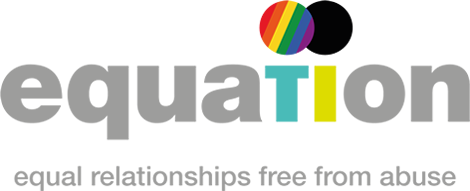Meet Isaac – our Safer Accommodation Outreach Worker. Isaac supports men and LGBTQ+ people to create a safe space that they can call home. From making their current home feel safer, or finding somewhere else to live, short or long-term. Here Isaac talks about his typical day.
After studying law at Nottingham University, my first job was with Support Through Court. There, I dealt with a mixture of homelessness and domestic abuse cases, helping people to fill in paperwork and apply for non-molestation orders, going to court with them, and even referring people to Equation. So, when I saw the role here at Equation, it seemed like a good fit. Also, I’m gay so this job brings all that together.
What does your day look like?
My day starts between 8.30 and 9. I’ll check emails to see if there are any messages from professionals or survivors and check my calendar to find out what I’ve got on today. We use a case management system, so I check this for updates on my cases, either from the helpline or another worker.
I start making calls to any clients I need to speak to. I’ve received a referral from Housing Aid – someone mentioned domestic abuse during their homelessness assessment so I call them to work out the best way to get in touch with the person needing help so I can do a risk assessment. Once I’ve done that, I share this with Housing Aid and give them my professional opinion on what that person needs, such as what kind of accommodation they need or funds that they’re entitled to.
One client is in social housing, so I call the housing patch manager about getting adaptations in place such as alarms, cameras or changing the locks if the perpetrator has the keys.
Next up, I’m delivering online training to housing associations on LGBT experiences of domestic abuse. This goes through the additional risks and barriers faced by LGBT people and how to tackle this. These sessions are really interesting. What I like about delivering training is giving professionals the tools and the knowledge to be in a better place to work with LGBT survivors.
It’s lunchtime now. Our team often have lunch together in our office. We can be dealing with difficult stuff during the day, so this is a really nice way to give us time to sit and talk about something else.
After lunch, I’m off to do a joint home visit with a solicitor to help with an occupation order which sets out who has the legal right to stay in a property, and a non-molestation order to stop the perpetrator from making contact.
Back to the office, I take a call from a young gay man experiencing abuse from a family member. He has young daughter. It’s difficult when men have children with them as the accommodation choices are limited to refuge or hotel until something more suitable comes up. There’s been another incident, so I review the risk and decide that a referral to MARAC is needed. I use the LGBT additional risks check list – this is an extra set of questions that we ask on top of the usual risk assessment. These look out for forms of coercive control, physical, sexual and emotional abuse that might not be picked up in the usual risk assessment.
Our team often have lunch together in our office. We can be dealing with difficult stuff during the day, so this is a really nice way to give us time to sit and talk about something else.
Then after a few more calls, I follow up on a case. A survivor’s ex-partner turned up at their property and breached the domestic violence protection order, so I call the officer in charge of the case to find out what they’re planning to put in place to prevent this from happening again. Afterwards I call the survivor to update them. They’re feeling reassured.
It’s getting late in the day, and I get a call from a survivor we’re already supporting. A man who will be homeless for the weekend and we’ll have no way to contact him by phone during that time. I call housing services and give them all the details as to why he needs accommodation, so if there’s an out of hours handover, there will be enough information for them. There’s a rush to get this done before the end of the day, to make sure they’re well supported during the night until services fully reopen again tomorrow.
Finally, a last check of emails, and I’m off home.
What’s most difficult about your job?
Working in housing can be challenging. Most of my job is in the city where there’s not always enough safe accommodation to meet people’s needs, so there’s a need to be creative and find solutions. Multi agency working is good but can be challenging with different perspectives and ideas and obviously services are under-funded and oversubscribed.
What do you like about your job?
I like it when you get to see a case all the way through and see someone’s trauma reduce and their sense of wellbeing improve over time. You can get a sense that the support is coming to an end, when the impacts of abuse aren’t so prevalent in their daily lives, and everything is wrapping up well.
Find out more about our domestic abuse support for men and LGBT survivors.
Is it abuse
Not sure if what you're experiencing is abuse?
Get help
Stalking advisory service
Find out more.
How you can help
No matter how much time, money or resources you can afford to give, your support will make a difference.
£10
Give monthly
Could pay for four children
to take part in our early intervention projects
£30
Give once
Could pay for one primary school child to receive our healthy relationship education program
Support equation
Check out the other ways you can support us

